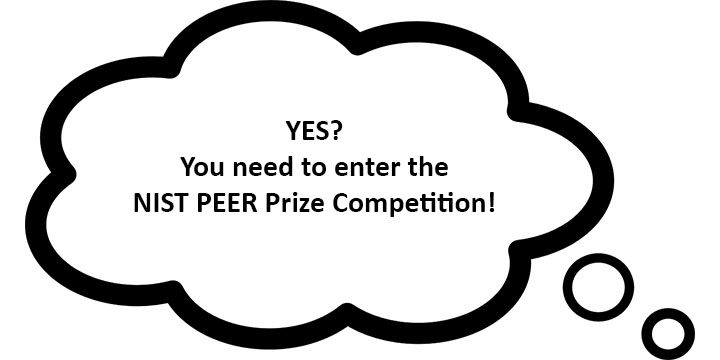PEER
This Competition Closed 20 November 2020. Thank you to all participants.
Partners Engaged in Extramural Reporting
Prize Competition


The National Institute of Standards and Technology's PEER Prize Competition seeks solutions to incentivize the recipients of federal R&D funding to comply with Bayh-Dole reporting requirements. The prize competition will award $10,000 in prize money spread among the top 3 finishers as determined by an expert panel of judges.
The Problem
Each year the federal government spends more than $70 billion on extramural research projects undertaken by universities and companies across the nation that focus on a wide range of scientific and technology developments. This research often leads to the creation of numerous inventions that help drive innovation and significantly contribute to our country’s economic growth and prosperity.
In 1980, Congress passed the Bayh-Dole Act which established the current rules governing the rights and responsibilities of extramural (external to the U.S. Government) recipients of Federal research and development (R&D) funds. The law allows funding recipients to retain the intellectual property rights (IP) associated with the technologies they produce. Additionally, the law requires several compliance requirements that impact ownership rights, including timely reporting to the Federal funding agency of inventions disclosure, notice of title election to funded inventions, and filing of patent applications. The compliance elements are designed to protect the public’s investment by ensuring that the IP associated with resulting inventions are developed in a timely and correct manner.[1]
Both Federal funding agencies as well as recipients of federal funds benefit from compliance with the requirements of Bayh-Dole regulations. Noncompliance with Bayh-Dole regulations results in underreporting of IP that arises from R&D activities funded by U.S. taxpayers. The incomplete reporting is concerning as it is not an accurate representation of the value derived for the Nation from Federal R&D investments in industry and nonprofit organizations, including universities. Inventors at universities, small businesses, and other recipients of federal R&D funding should report their inventive successes as a way to contribute to the data used by policy makers and stakeholders to assess the value, performance, and impact of extramural programs.
Many large institutions have well-established technology transfer offices that routinely comply with Bayh-Dole regulations, but studies have shown that many recipients, especially small businesses and universities, have a comparatively poor compliance record. Though funding recipients may lose rights to Bayh-Dole subject invention patents, there may be many causes for underreporting and non-compliance with Bayh-Dole reporting requirements. Adding to the problem, many funding agencies routinely fail to adhere to compliance issues.[2]
The goal of this Challenge is to inform the development and execution of program activities and communications designed to promote Bayh-Dole compliance. Successful submissions will propose mechanisms that motivate increased Bayh-Dole compliance reporting activities by recipients of Federal R&D funding.
Respondents to this Challenge are asked to submit creative ideas and solutions that will help organizations overcome barriers in Bayh-Dole compliance reporting. While lack of adequate and/or knowledgeable staffing, cost of reporting and compliance, inadequate training, and many other factors have been cited as reasons for Bayh-Dole underreporting, no solutions have yet been successfully implemented.
For more information, go to Background Information.
[1] For a complete list see https://public.era.nih.gov/iedison/public/timeline.jsp
[2] Reporting Requirements for Federally Sponsored Inventions Need Revision (Aug 1999) https://www.gao.gov/products/GAO/RCED-99-242
Dates of the Competition
- Submissions Accepted Starting: Wednesday, October 28th, 2020
- Submission Period Close: Friday, November 20th, 2020
Contact Information
Email: NISTpeerprize [at] nist.gov (NISTpeerprize[at]nist[dot]gov)
Phone: 202-604-1956
Funding Information
The PEER Prize is funded using NIST Lab-to-Market (L2M) funds. The L2M program supports interagency efforts to advance the President’s Management Agenda’s Cross-Agency Priority goal to improve transfer of Federally-funded technologies from the Lab-to-Market.

